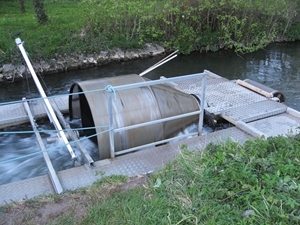 During late summer each year, 10,000 juvenile salmon and 2,000 brown trout are tagged with passive integrated transponder (PIT) tags, the aim being to see how many have survived the winter and are heading to sea in the spring. To this end we utilise a rotary screw trap (RST) at East Stoke (BH20 6BB) on the Frome, running from late March until about mid-May, to recapture a percentage of the previous year’s PIT-tagged parr.
During late summer each year, 10,000 juvenile salmon and 2,000 brown trout are tagged with passive integrated transponder (PIT) tags, the aim being to see how many have survived the winter and are heading to sea in the spring. To this end we utilise a rotary screw trap (RST) at East Stoke (BH20 6BB) on the Frome, running from late March until about mid-May, to recapture a percentage of the previous year’s PIT-tagged parr.
Years of experience of both tag detections and running of this trap have shown that the bulk of the migration happens during the hours of darkness. Operating the trap when the smolts are moving means night-time work, and as the GWCT Fisheries is a small department, we are looking for help with this project. We always have two people working at night, one of which is a staff member who holds the correct Home Office certification and experience, but the second person is where we need volunteers.
If interested in helping then you need to know that night shifts start at dusk and will continue until the early hours when most fish stop moving, presumably to avoid first light and high activity of predators such as pike. A head torch will be provided for working on the trap. We also run the trap during office hours and help during these hours may also be part of the job.
During each shift the RST is checked every half hour, when all fish are netted from the holding tank at the rear. These fish are then taken inside the fluvarium for processing before release further downstream to continue their migration. Assistance is required for the netting as well as taking of biometric data from each fish.
Although based under cover, it is still cold at night during March and April, and all volunteers should be prepared for this with plenty of warm clothing. Wellington boots are also recommended as it makes releasing the fish far easier. Some periods are very busy with lots of smolts running, whereas others are less busy so make sure to bring plenty work or reading to fill gaps in less busy periods. We consider safety a high priority (hence two people at night) and life jackets are always available whilst on the trap.
If you would like to volunteer or have any questions, please contact Luke Scott at ljscott@gwct.org.uk.